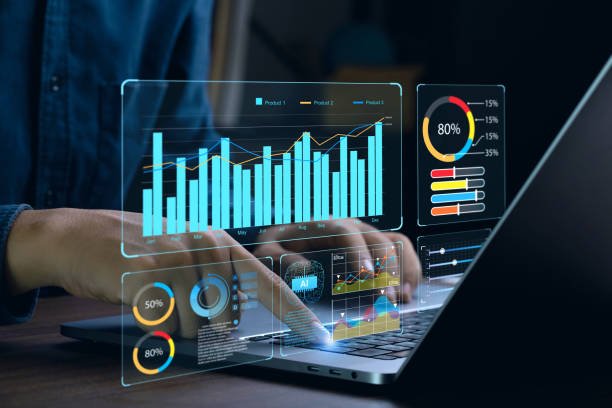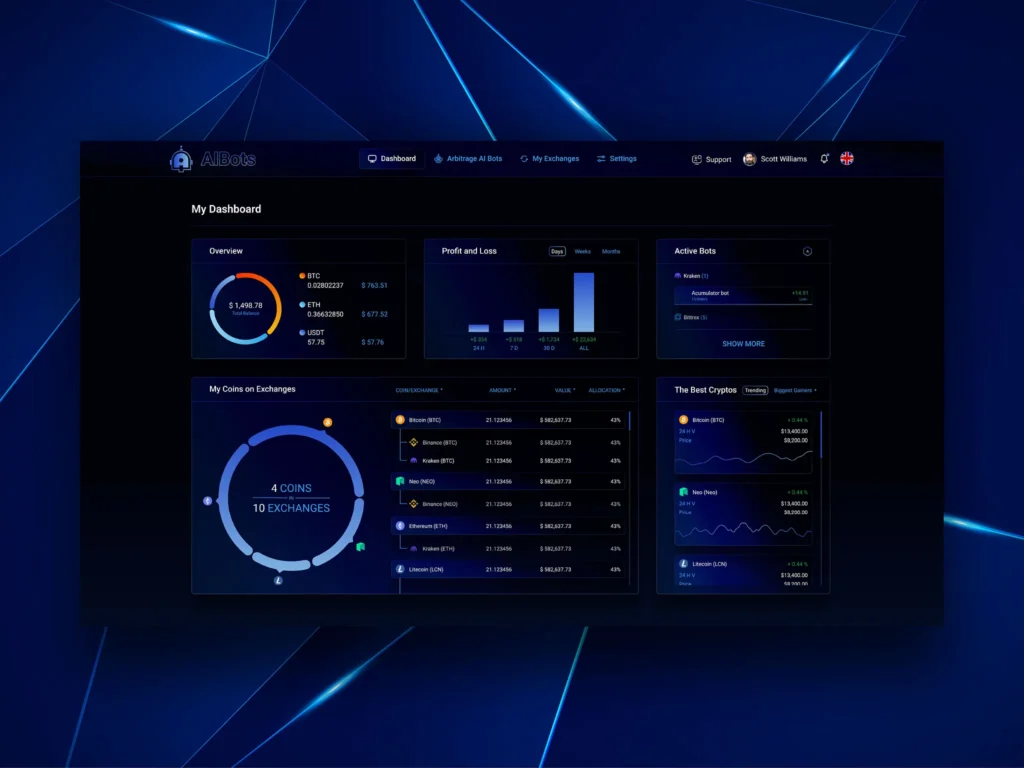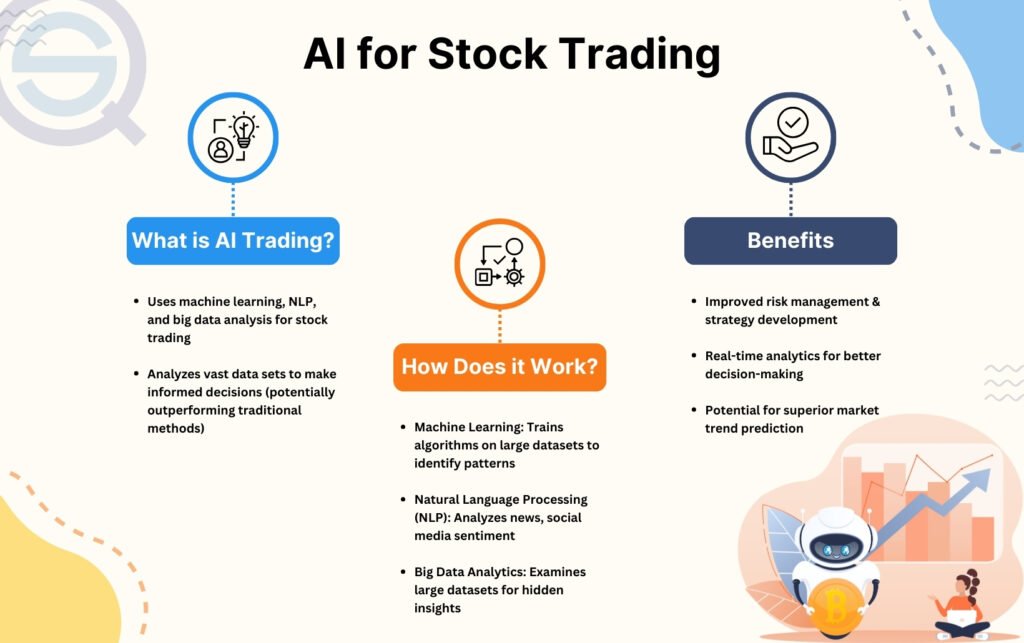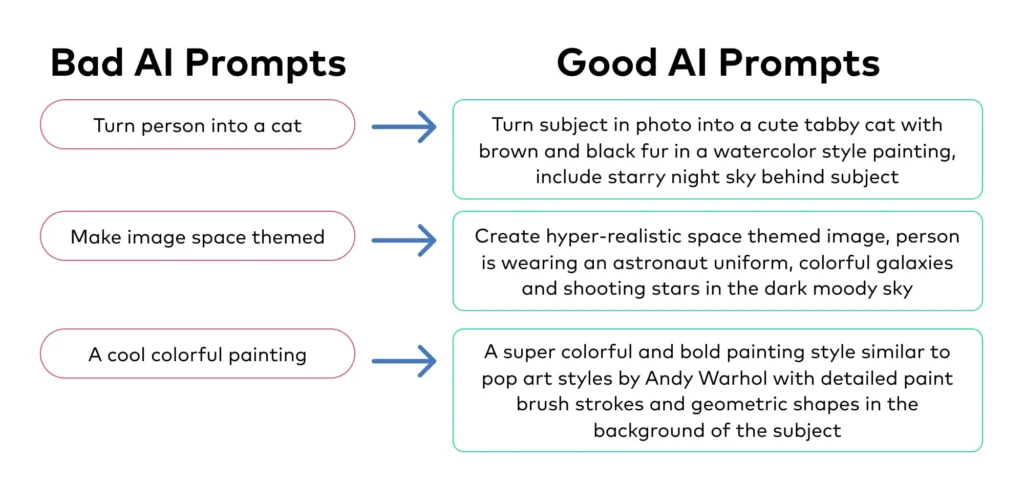
Artificial Intelligence (AI) is revolutionizing the world of finance. From predicting trends to automating trades , AI-powered tools are helping both retail and institutional investors make smarter, faster decisions.
Whether you’re a beginner or an experienced trader, learning how to use AI for stock trading can help you:
- Analyze large amounts of data quickly
- Spot patterns and trends humans might miss
- Automate repetitive trading tasks
- Reduce emotional decision-making
- Improve risk management
Step-by-Step: How to Use AI for Stock Trading
1. Use AI for Market Analysis & Trend Prediction

What it does:
AI models can process massive datasets—including news, earnings reports, economic indicators, and social sentiment—to predict stock price movements.
How to use it:
- Use platforms like:
- TradingView (with AI signals)
- Tickeron – AI that scans markets for patterns
- Kavout – AI-driven stock rankings and heatmaps
- Get real-time insights and alerts based on machine learning algorithms.
📌 Best for: Day traders and long-term investors looking for data-backed decisions.
2. Automate Trades with AI-Powered Bots
What it does:
AI trading bots execute buy/sell orders automatically based on pre-set rules and conditions.
How to use it:
- Choose a platform like:
- Alpaca – API-based trading with AI integration
- MetaTrader 5 (MT5) – Supports AI/EA (Expert Advisors) trading bots
- 3Commas , Cryptohopper – For crypto + stock algo trading
- Set up strategies (e.g., moving average crossovers, RSI thresholds).
- Let the bot trade while you sleep!
💡 Tip: Always backtest your strategies before going live.

3. Leverage Sentiment Analysis for Smarter Decisions
What it does:
AI scans news articles, social media posts, and forums to gauge public sentiment about stocks or companies.
How to use it:
- Try tools like:
- StockSniper – Analyzes Reddit, Twitter, and news
- Sentieo – Search engine for investor research with NLP
- Bloomberg Terminal (AI-enhanced) – For professionals
- Track positive/negative sentiment shifts and adjust your trades accordingly.
📌 Best for: Tracking hype around new stocks, IPOs, or trending assets.
4. Improve Risk Management with AI Insights
What it does:
AI helps assess portfolio risk by simulating different market scenarios and suggesting optimal asset allocations.
How to use it:
- Use platforms like:
- Betterment , Wealthfront – Robo-advisors powered by AI
- Portfolio Visualizer – Backtesting with AI modeling
- Input your goals and let AI recommend adjustments to reduce volatility or maximize returns.
5. Build Your Own AI Models (Optional)
What it does:
For advanced users, building custom AI models allows full control over your trading strategy.
How to use it:
- Learn Python and libraries like:
- Pandas , NumPy – For data manipulation
- TensorFlow , Scikit-learn – For machine learning
- Use platforms like Google Colab , QuantConnect , or Kaggle to build and test your own trading algorithms.
📌 Best for: Tech-savvy traders or those looking to go beyond off-the-shelf tools.

🚀 Final Tips for Using AI in Stock Trading
- Start small and test AI tools with paper trading before investing real money.
- Combine AI insights with your own knowledge and experience.
- Keep learning about AI finance tools and updates.
- Be cautious of “get rich quick” AI promises—always verify results.
- Follow ethical and legal guidelines when automating trades.
❓ Frequently Asked Questions (FAQs)
Q1: Can AI accurately predict stock prices?
A: AI can identify patterns and probabilities, but it cannot guarantee 100% accuracy due to the unpredictable nature of markets. It works best as a support tool rather than a crystal ball.
Q2: Is AI trading legal and safe?
A: Yes, AI trading is legal and widely used by hedge funds and individual traders. However, always ensure compliance with your broker’s terms and local regulations.
Q3: Do I need coding skills to use AI for stock trading?
A: Not necessarily! Many platforms offer no-code or low-code AI tools for trading. However, knowing some programming gives you more flexibility and control.
Want more tips on using AI in finance and stock trading? Subscribe to our newsletter and get weekly insights, tools, and tutorials delivered straight to your inbox!






0 Comments